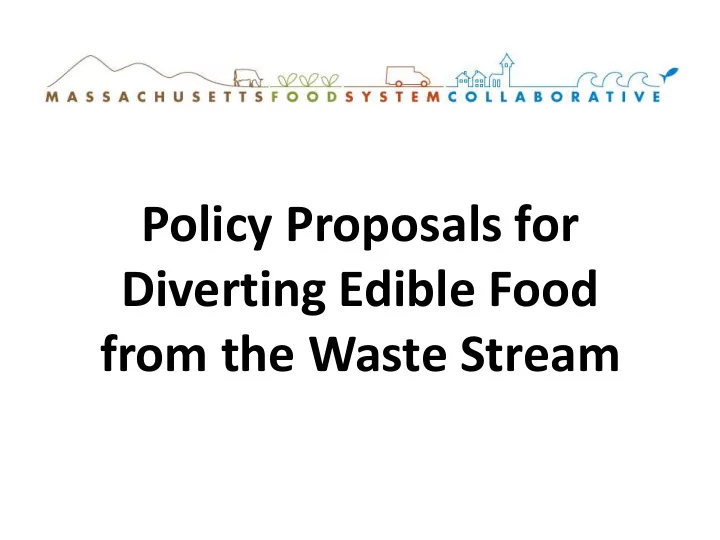

Policy Proposals for Diverting Edible Food from the Waste Stream
Background • Food waste and other organic material make up approximately 25 percent of all waste disposed of every year. • Over one million tons of compostable waste landfilled annually • 900,000 tons of that is food. Source: Mass Dep
Priorities for Diverted Edible Food • Safety • Getting it to the right people • Economics
Policy Proposal: Tax Incentives Provide a tax credit to individuals, businesses, and • institutions that donate food to nonprofit organizations that distribute that food to those in need. (S.1495/H.2626, S.838/H.3327) Increased tax credit, perhaps an additional for MA grown • and made foods, and for healthy foods. Provide credit even if nonprofit food recovery organizations • charge a nominal amount that covers the cost of handling. Credit should cover transportation costs for the donated • food.
Policy Proposal: Limit Liability MA Good Samaritan law (ch. 94, § 328) offers liability protections • when food is donated to a nonprofit organization that then distributes that food to those in need. Extend to food service establishments, retail stores, and farms • donating directly to end recipients. (H.3238, S.848, S.838, and H.3327) Extend liability protection regardless of compliance with any • laws, regulations, or ordinances regulating the packaging or labeling of food. Department of Public Health should create model regulations • about food safety for food donations, including guidance for municipal boards of health to consider.
Policy Proposal: Standardize Labels • Standardize date labeling requirements to reflect the recently announced private sector initiative, where “Best If Used By” dates are an indicator of quality, and “Use By” dates are an indicator of safety.
Policy Proposal: Waste in Schools Create guidance documents for voluntary programs • encouraging the donation of surplus food from school meals, as in S.292. Offer Versus Serve allows students to decline some of the • food offered in a federally reimbursable school lunch or breakfast, in order to reduce food waste and permit students to choose the foods they want to eat. Enact mandatory minimum lunch periods or promote • longer lunch periods. Allocate funds to conduct waste audits in school cafeterias, • in an effort to reduce school food waste statewide.
Policy Proposal: Strengthen Organic Waste Ban Legislative action should be taken supporting the Ban, • promoting food donation and recovery efforts, and allocating funds to support the Ban. Review best practices in waste reduction. Consider ideas • like: – imposing surcharges on landfilled or incinerated waste that would go toward public education about waste reduction; – taking steps to incentivize decreased waste generation at the municipal level; – requiring measures that would make it easier to enforce waste bans; and – broadening the organics waste ban to cover producers generating more than a half ton of food waste per week (rather than the existing threshold of one ton).
Policy Proposal: Food Waste Challenge • Create educational materials and campaigns for schools, consumers, businesses, and nonprofits about food waste reduction practices. • Develop and implement a food recovery challenge, as has been done nationally by the EPA.
Inedible Food Waste Animal feed • – Cleaning and pelletizing Compost • – Support farms – Develop markets/MA preference – Municipal aggregation Anerobic digestion • – Support smaller scale – Develop markets for byproducts Landfill •
Other food waste issues • Infrastructure for donations • Processing infrastructure
Contact www.mafood foodsystem. em.org winton@ on@ma mafoo foodsystem. m.or org
Recommend
More recommend